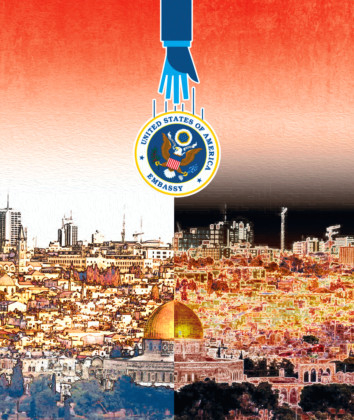The Arab World is abuzz with United States President Donald Trump’s decision to transfer the US embassy from Tel Aviv to occupied Jerusalem — an act that could take up to three years, according to US administration officials. Loud words are being heard on all four corners of the Arab world, with groups like Hezbollah and Hamas threatening to open “the gates of hell” on Israel, if Trump puts his words into action. None of these big threats are new, after all. Hamas has issued the exact same warning at least nine times in the past three years.
Yesterday, after prayer, in some of the Arab capitals, governments, schools and labour unions demonstrated in favour of occupied Jerusalem remaining the capital of a unified Palestine. Patriotic songs are already booming out of Arabic radio channels, while Arabists on social media networks have draped their profile photos with flags of Palestine. Next weekend, an “emergency session” of the Arab League will be convened in Amman, followed by Organisation of the Islamic Cooperation Council. Big words will echo in the conference rooms, followed by high-pitched resolutions of defiance. But will it end there? Reading through modern Arab history, it is not such a big surprise.
The last major Arab achievement in the city was erected during the days of the Umayyad Dynasty. The Dome of the Rock, built on the Temple Mount and believed to be from where the Prophet Mohammad [PBUH] embarked upon his night journey to heaven, and the Al Aqsa Mosque are more than 1,300 years old, built by Abdul Malek Ibn Marwan and his son, Al Walid. Following the downfall of Umayyads, Muslim attention and funds shifted to Baghdad, the new capital of the Muslim Empire. As a result, formerly glorious cities like Jerusalem and Damascus were ignored and neglected, left to crumble by the Abbasids.
Befallen city
The Muslims only took note of Jerusalem once again after it was occupied by the Crusaders in June 1099. Long poems were penned in eulogy of the befallen city, until Saladin marched into Jerusalem in 1187, re-taking the city. It once again slipped into haunting darkness, witnessing a sharp drop in its population, due to widespread illness and terrible sanitation. The Ottoman Turks treated Jerusalem and Damascus as jewels of the crown of their Arab cities, proud of their religious significance. Its great wall was reconstructed by Sulaiman the Magnificent, while modern postal, coach, and carriage services were built to meet the needs of European consulates based in Jerusalem. This attention started to erode with the steady decline of the Ottoman Empire, starting in the mid-19th century.
The city only witnessed a renaissance under British rule, who transformed Jerusalem into a money-generating city, revamped, modernised and upgraded to attract tourists from across the world. The Arabs never accepted British rule in Jerusalem — waging one revolt after the other, accumulating in a general military uprising in 1936, led by the city’s Grand Mufti Ameen Al Hussaini. In 1947, the United Nations suggested the “internationalisation” of Jerusalem, dividing the rest of the country between Arabs and Jews. Arab capitals refused to accept the UN Partition Plan. Instead of being internationalised and placed under UN trusteeship, Jerusalem was divided between Arabs and Jews. The Arabs got its eastern part, with all of its historic places of worship, while the Jews got West Jerusalem.
East Jerusalem was annexed to the newly-created kingdom of Jordan, whose founder, King Abdullah Bin Al Hussain, regarded his stay in Jordan as only temporary. Amman was completely unprepared to serve as temporary capital for his political ambition. He decided to modernise it. State funds poured into Amman while Jerusalem got little. When the Palestine Liberation Organisation charter was authored, it didn’t even mention the city of Jerusalem and its name was barely uttered by former Egyptian president Jamal Abdul Nasser — until the Israeli Army marched into its eastern quarters, in 1967. Overnight it became a topic of high discourse, just like it was suddenly remembered by us today, after Trump’s “historic” decision.
It remains to be seen if this will soon fizzle out — just like all other bouts of enthusiasm.
Sami Moubayed is a Syrian historian and former Carnegie scholar. He is also the author of Under the Black Flag: At the frontier of the New Jihad.









